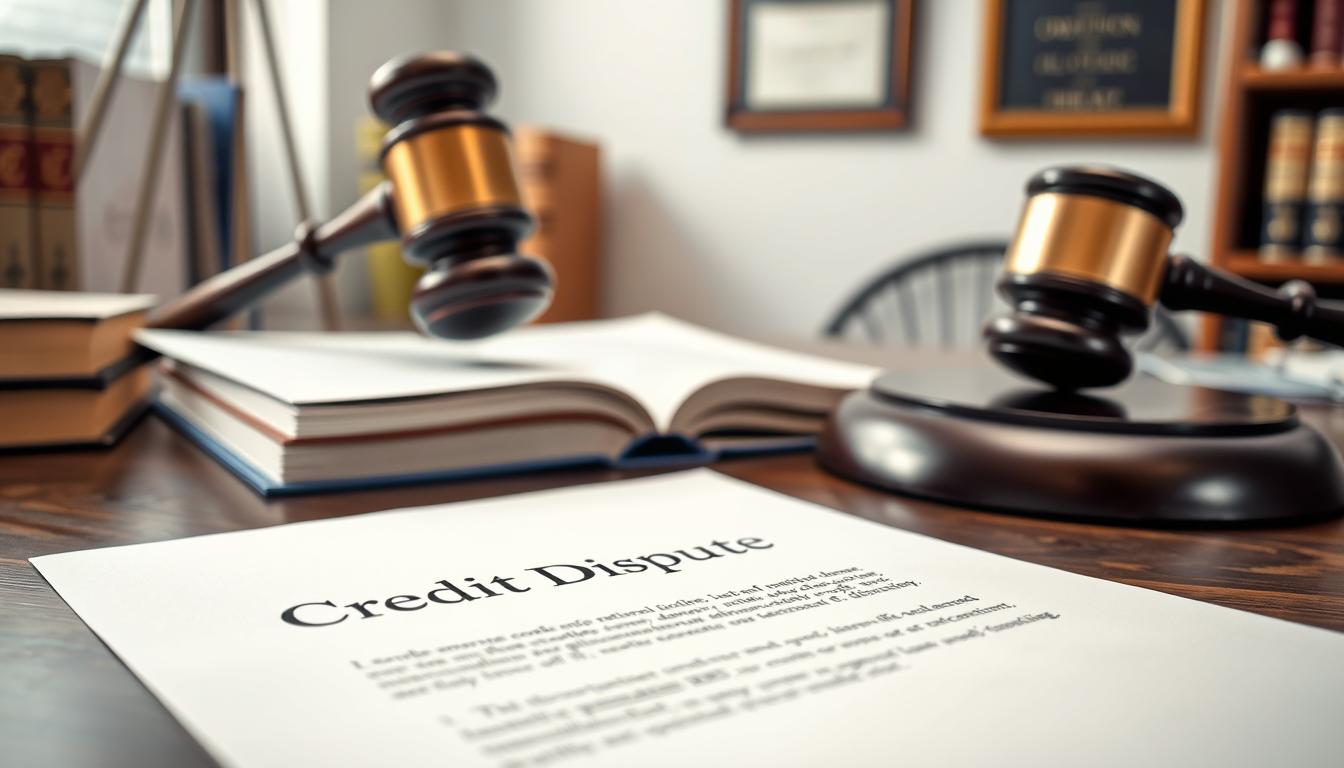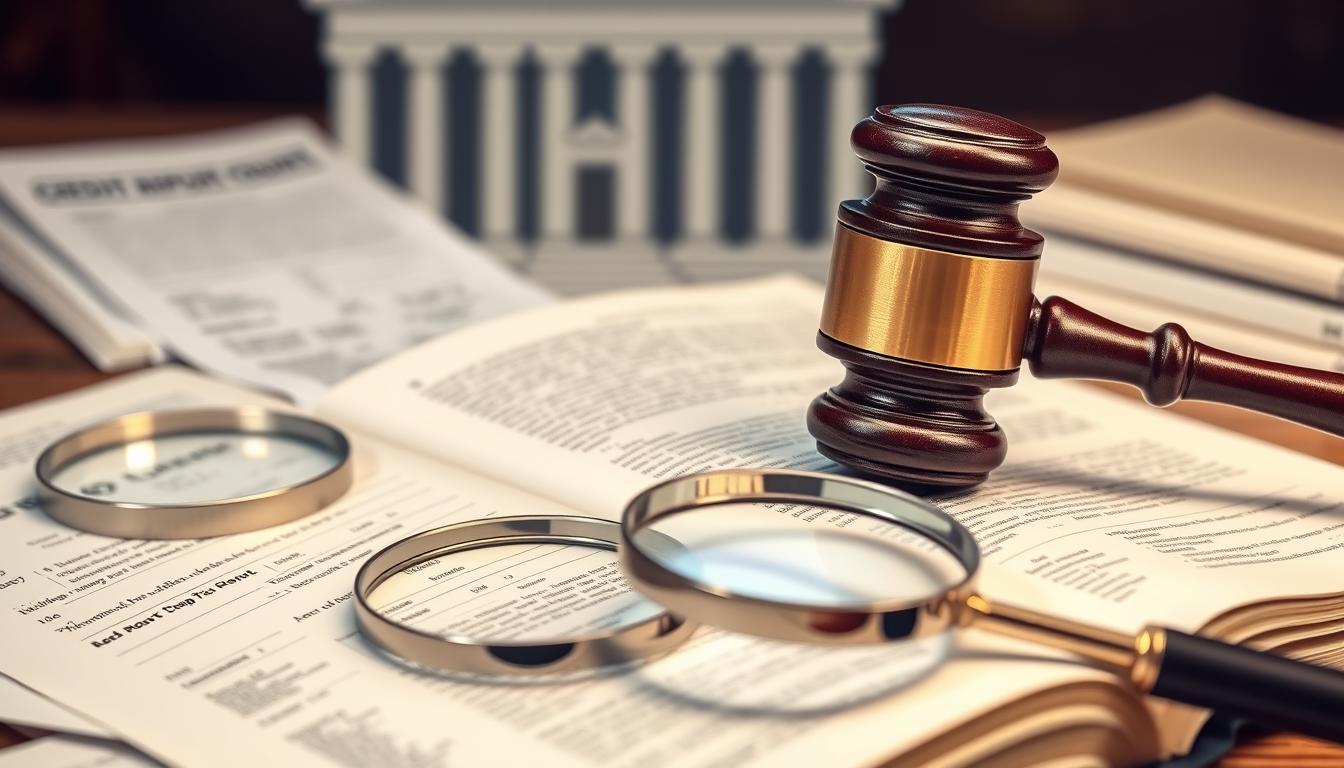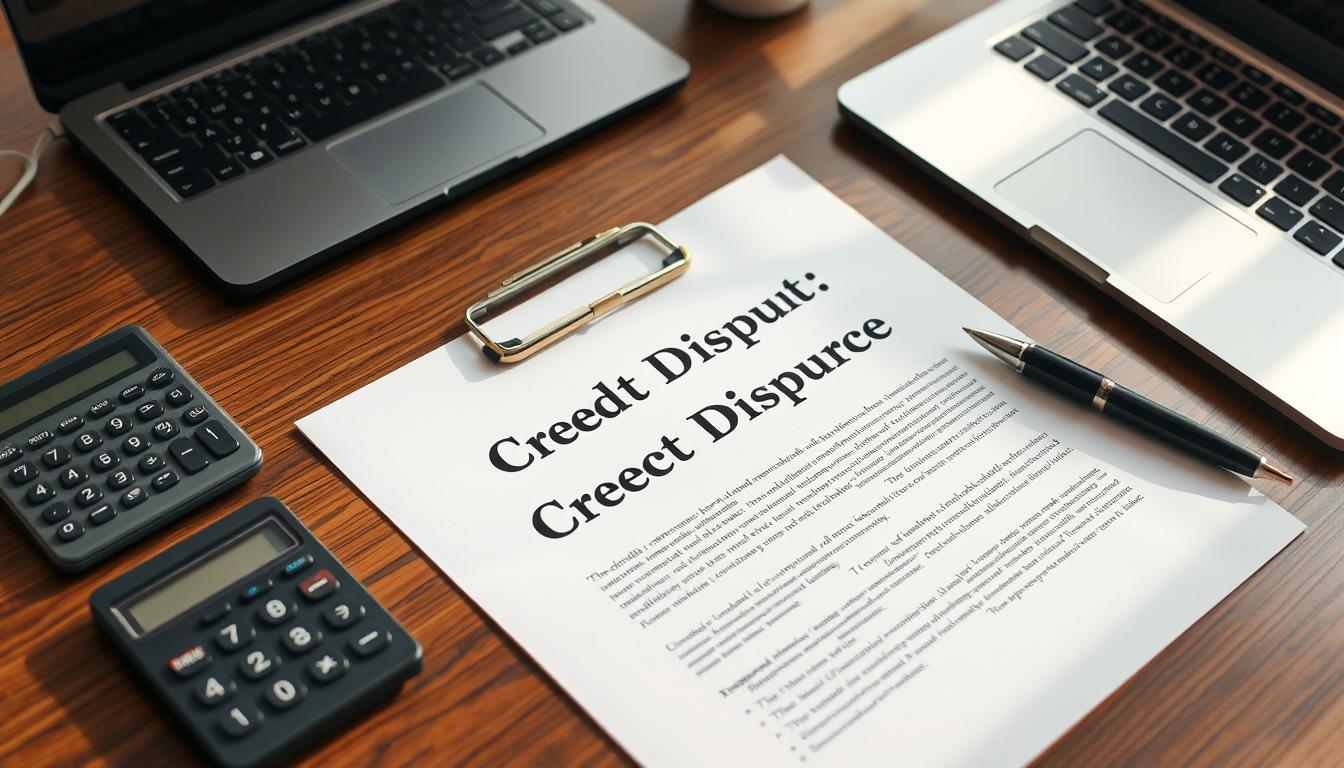A strong credit score is vital in today’s financial world. Credit report errors can hurt your financial goals. They can lead to loan denials and higher interest rates.
A lawyer’s expertise can be invaluable in these situations. They can write a professional credit dispute letter for you. This helps you navigate the complex credit reporting system confidently.
Key Takeaways
- Hiring a lawyer to write your credit dispute letter can help ensure your rights are protected and your case is presented effectively.
- A credit dispute letter can address a variety of issues, including inaccurate information, fraudulent accounts, and debt collection errors.
- The Fair Credit Reporting Act (FCRA) outlines consumer rights and the responsibilities of credit bureaus, which a lawyer can leverage to your advantage.
- Professional assistance can increase the chances of successfully removing negative items from your credit report and improving your overall credit score.
- By taking the necessary steps to dispute credit report errors, you can take control of your financial future and achieve your long-term goals.
Introduction to Credit Dispute Letters
A strong credit score is vital for financial health. It affects your ability to get loans, credit cards, and housing. Credit report errors are common and can harm your score. Credit dispute letters help fix these issues.
Importance of Maintaining a Good Credit Score
Your credit score shows how creditworthy you are. It’s based on payment history, credit use, and credit length. A high score can lead to better interest rates and loan terms.
A low score makes it hard to get financing or rent an apartment. It can even affect your job prospects.
Common Errors on Credit Reports
- Inaccurate account information, such as incorrect balances or payment histories
- Identity theft, where fraudulent accounts are opened in your name
- Mistaken identity, leading to someone else’s information appearing on your report
- Outdated or incomplete information, such as closed accounts still being reported as open
These credit report errors can greatly impact your finances. It’s crucial to check your credit report often. Address any issues you find promptly.
| Type of Credit Report Error | Potential Impact on Credit Score |
|---|---|
| Inaccurate account information | Lowered credit score, difficulty securing loans or credit |
| Identity theft | Severely damaged credit, potential financial and legal consequences |
| Mistaken identity | Inaccurate credit information, difficulty resolving the issue |
| Outdated or incomplete information | Discrepancies in credit history, potential impact on credit score |

Know the value of a good credit score. Be aware of common credit report errors. Take action to keep your credit info accurate. Protect your financial future.
lawyer to write a credit dispute letter
Hiring a lawyer for credit report disputes can be a game-changer. Their expertise significantly improves your chances of success. Let’s explore the key benefits of using a lawyer for credit dispute letters.
Expertise in the Fair Credit Reporting Act
Lawyers specializing in credit disputes know the Fair Credit Reporting Act inside out. They understand the complex legal landscape of credit reporting. This knowledge helps them craft stronger, more effective dispute letters.
Effective Communication with Credit Bureaus
Credit bureaus respond better to formal letters from lawyers. Legal correspondence carries more weight than individual consumer disputes. A lawyer’s letter can speed up the resolution of your credit issues.
Comprehensive Strategies for Improving Your Credit Score
Experienced lawyers know the best strategies to boost your credit score. They go beyond just disputing errors. Lawyers can guide you on credit repair tactics and addressing financial problems.
Hiring a lawyer for credit dispute letters is an investment in your financial future. Their expertise and resources help navigate the credit reporting system effectively. The goal is a clean, accurate credit report reflecting your true financial standing.

Understanding the Fair Credit Reporting Act
The Fair Credit Reporting Act (FCRA) protects consumers’ rights regarding credit information. It governs how credit data is collected and used. This law is key for disputing credit report errors.
The FCRA gives consumers several important rights. These include free annual credit reports and the ability to dispute inaccuracies. Consumers can also opt-out of pre-approved offers.
- Access their credit reports for free on an annual basis
- Dispute any errors or inaccuracies found on their credit reports
- Receive notice when adverse information is reported to a credit bureau
- Opt-out of pre-approved credit and insurance offers
- Seek damages from companies that violate the FCRA’s provisions
Knowing the Fair Credit Reporting Act helps protect consumer rights. It ensures credit information accuracy. This knowledge is vital for disputing errors and maintaining good financial health.

The FCRA sets rules for credit bureaus and lenders. They must ensure accurate data collection and reporting. Strict procedures apply when investigating disputes.
Non-compliance with the FCRA can lead to legal issues. These may include lawsuits and monetary damages.
“The Fair Credit Reporting Act is a critical piece of legislation that empowers consumers to take control of their financial futures.”
Steps to Dispute Credit Report Errors
A healthy credit report is vital for many life opportunities. Errors can happen, but you can fix them. Let’s explore how to dispute credit report errors effectively.
Gathering Supporting Documents
First, collect all relevant documentation. This includes your credit reports from Experian, Equifax, and TransUnion. Gather bills and statements that prove the errors on your report. Also, prepare proof of your identity, like a driver’s license copy.
- Copies of your credit reports from the three major credit bureaus: Experian, Equifax, and TransUnion.
- Copies of any bills, statements, or other documents that prove the errors on your credit report.
- Proof of your identity, such as a copy of your driver’s license or passport.
Writing an Effective Dispute Letter
Next, draft a well-crafted dispute letter. Your letter should clearly identify the specific errors on your credit report. Explain why the information is inaccurate and include supporting documents as evidence.
Request that the credit bureau investigate the disputed items. Ask them to remove these items from your credit report. Keep your letter brief and focused.
- Clearly identify the specific errors on your credit report.
- Provide a detailed explanation of why the information is inaccurate.
- Include copies of the supporting documents as evidence.
- Request that the credit bureau investigate the disputed items and remove them from your credit report.
Send your letter via certified mail with a return receipt. This ensures delivery and creates a paper trail.
| Credit Bureau | Dispute Address |
|---|---|
| Experian | P.O. Box 4500, Allen, TX 75013 |
| Equifax | P.O. Box 740256, Atlanta, GA 30374 |
| TransUnion | P.O. Box 2000, Chester, PA 19016 |
By following these steps, you can successfully dispute credit report errors. Take control of your financial future and protect your credit score.
Sample Credit Dispute Letter
A well-crafted credit dispute letter is vital for fixing errors on your credit report. It helps you communicate your concerns effectively to credit bureaus. Let’s look at a sample letter you can use as a guide.
Your credit dispute letter should be brief, clear, and include supporting documents. Here’s a sample letter that follows these guidelines:
“Dear [Credit Bureau Name],
I am writing to dispute the following item on my credit report: [Specific Item in Question].
This item is [Inaccurate/Incomplete/Unverifiable] because [Provide Explanation].
I have enclosed [List of Supporting Documents] to support my claim.
Please investigate this matter and provide me with a written response within 30 days, as required by the Fair Credit Reporting Act. If the item is found to be inaccurate, please remove it from my credit report immediately.
Thank you for your prompt attention to this matter.
Sincerely,
[Your Name]”
A successful credit dispute letter has several key elements. These include identifying the disputed items and explaining why they’re wrong. You should also provide proof and ask for a quick response.
- Identifying the specific item(s) you are disputing
- Explaining why the item is inaccurate, incomplete, or unverifiable
- Providing supporting documentation
- Requesting a timely investigation and response
- Requesting the removal of the disputed item if found to be inaccurate
Using this template and including necessary details will make your letter stronger. It will increase your chances of getting a good result from credit bureaus.

| Key Elements of a Successful Credit Dispute Letter | Explanation |
|---|---|
| Identification of the specific item(s) in question | Clearly state the specific item(s) on your credit report that you are disputing. |
| Explanation of why the item is inaccurate, incomplete, or unverifiable | Provide a clear and concise explanation of why the item is inaccurate, incomplete, or cannot be verified. |
| Provision of supporting documentation | Include copies of any documents that support your claim, such as payment records or correspondence with creditors. |
| Request for a timely investigation and response | Clearly state that you expect the credit bureau to investigate the matter and provide a written response within the 30-day timeframe required by the Fair Credit Reporting Act. |
| Request for the removal of the disputed item if found to be inaccurate | If the item is found to be inaccurate, request that the credit bureau remove it from your credit report immediately. |
Dealing with Credit Bureaus
Interacting with credit bureaus is vital for fixing credit report errors. The right approach can make a big difference in resolving disputes. Understanding this process helps protect your financial health.
Submitting the Dispute Letter
Send your credit dispute letter via certified mail with a return receipt. This provides proof of delivery and officially records your dispute.
Include copies of documents that support your claims. These help strengthen your case and speed up the resolution process.
Following Up on the Dispute
Credit bureaus must investigate disputed items within 30 days. Watch your credit report closely during this time for any changes.
If you’re unhappy with the results, ask for a copy of the investigation. You can then provide more information to support your case.
| Key Steps for Dealing with Credit Bureaus |
|---|
|
The credit repair process can be tricky, but don’t give up. Stay persistent and know your rights. This will help you fix errors on your credit report.
Consumer Rights and Credit Reporting
The Fair Credit Reporting Act (FCRA) protects consumer rights in credit reporting. It sets rules for credit bureaus, lenders, and others involved in the process. The FCRA ensures fairness and accuracy in credit reporting.
Consumers can access free credit reports under the FCRA. They can dispute errors and have them corrected quickly. This protection shields individuals from negative impacts of wrong information on their reports.
Incorrect data can affect credit, housing, or job opportunities. The FCRA helps prevent these issues by giving consumers control over their credit information.
- Consumers have the right to a free copy of their credit report from each of the three major credit bureaus (Experian, Equifax, and TransUnion) once per year.
- If a consumer finds an error on their credit report, they can dispute it directly with the credit bureau, who must investigate and respond within 30 days.
- Consumers also have the right to be notified when negative information is added to their credit report, and to have that information removed if it is found to be inaccurate or unverifiable.
Understanding FCRA rights empowers consumers to maintain accurate credit reports. This knowledge is key to achieving and keeping a healthy credit score.
Active involvement in credit report management is crucial. It helps ensure the integrity of your financial information.
| Consumer Rights | FCRA Protections |
|---|---|
| Free annual credit report | Consumers can obtain a free copy of their credit report from each of the three major credit bureaus once per year. |
| Dispute credit report errors | Consumers can dispute inaccurate or unverifiable information on their credit reports, and the credit bureaus must investigate and respond within 30 days. |
| Notification of negative information | Consumers must be notified when negative information is added to their credit report, and have the right to have that information removed if it is found to be inaccurate or unverifiable. |
Knowing your consumer rights under the FCRA is vital. It helps you manage your credit report effectively. This knowledge is key to maintaining a healthy credit score and securing favorable credit terms.
Improving Your Credit Score
A good credit score opens doors to better loans, jobs, and housing options. You can boost your score using several strategies. A credit dispute letter is a powerful tool to fix errors on your credit report.
Credit Repair Strategies
Boosting your credit score requires patience and effort. Here are some proven credit repair strategies to try:
- Check your credit report often. Dispute any errors you find. A lawyer to write a credit dispute letter can be a big help.
- Pay all bills on time. Your payment history greatly affects your credit score.
- Keep credit card balances low. Try to use less than 30% of your credit limit.
- Apply for new credit sparingly. Each application can temporarily lower your score.
- Become an authorized user on a card with a long, positive history.
These credit repair strategies can steadily improve your score. Better credit opens up more financial opportunities for you.
“Improving your credit score is like building a house – it takes time and effort, but the rewards are well worth it.”
Patience and persistence are vital when improving your credit score. With the right approach, you can achieve financial freedom.
Conclusion
This guide explains how to fix credit report errors and why hiring a lawyer helps. Understanding the Fair Credit Reporting Act is key to protecting your financial health. Taking action can help maintain a good credit score.
A lawyer can be a valuable asset when writing credit dispute letters. They know how to navigate the complex process and advocate for you. Their expertise ensures effective communication with credit bureaus and protects your rights.
A healthy credit report is vital for better loan and credit card terms. Fixing errors and working with a lawyer can improve your financial future. This approach helps you achieve the credit score you deserve.

